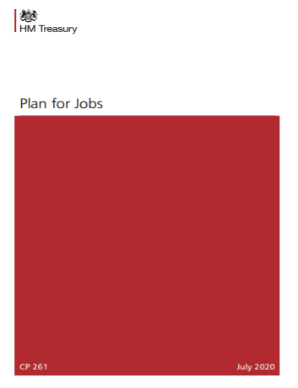UK GOVERNMENT’S PLAN FOR JOBS POST COVID

The Chancellor of the Exchequer has today released a policy document “Plan for Jobs” as its “Second Phase” to combat the economic impacts arising from the Covid 19 virus lockdown measures introduced last March. Phase 1 of the policy was the furlough scheme to promote job retention. This second phase comprises a series of policy measure to support the UK economic recovery –
https://assets.publishing.service.gov.uk/government/uploads/system/uploads/attachment_data/file/898421/A_Plan_for_Jobs__Web_.pdf
Key highlights are:
A new Kickstart Scheme will be introduced. A £2 billion fund to create hundreds of thousands of high quality 6-month work placements aimed at those aged 16-24 who are on Universal Credit and are deemed to be at risk of long-term unemployment. Funding available for each job will cover 100% of the relevant National Minimum Wage for 25 hours a week, plus the associated employer National Insurance contributions and employer minimum automatic enrolment contributions.
New funding for National Careers Service – The government will provide an additional £32 million funding over the next 2 years for the National Careers Service so that 269,000 more people in England can receive personalised advice on training and work.
An additional £111 million will be made availabe this year for traineeships in England, to fund high quality work placements and training for 16-24 year olds. This funding is enough to triple participation in traineeships. Funding will be given to employers who provide trainees with work experience, at a rate of £1,000 per trainee. The government will improve provision and expand eligibility for traineeships to those with Level 3 qualifications and below, to ensure that more young people have access to high quality training.
The government will introduce a new payment of £2,000 to employers in England for each new apprentice they hire aged under 25, and a £1,500 payment for each new apprentice they hire aged 25 and over, from 1st August 2020 to 31st January 2021. These payments will be in addition to the existing £1,000 payment the government already provides for new 16-18 year-old apprentices, and those aged under 25 with an Education, Health and Care Plan – where that applies.
The government will provide £101 million for the 2020-21 academic year to give all 18-19 year olds in England the opportunity to study targeted high value Level 2 and 3 courses when there are not employment opportunities available to them.
The government will expand and increase the intensive support offered by DWP in Great Britain to young jobseekers, to include all those aged 18-24 in the Intensive Work Search group in Universal Credit.
The government will provide £895 million to enhance work search support by doubling the number of work coaches in Jobcentre Plus before the end of the financial year across Great Britain.
TODAY, the Department for Work and Pensions (DWP) confirmed the following:
“The measures include:
Increase in work coaches and Job Centre Support: The Department will be doubling the number of work coaches to 27,000 by March 2021. Jobcentres will be increasing the amount of face-to-face support offered by putting in place measures including fitting screens, social distancing signage, face coverings and hand sanitisation facilities.
Kickstart Scheme: A job creation scheme that will provide high quality, 6-month work placements from Autumn this year. Funding available for each job will cover 100% of the relevant National Minimum Wage for 25 hours a week, plus the associated employer National Insurance Contributions and Employer Minimum Automatic Enrolment contributions. The scheme will be focused on supporting young people who are on Universal Credit and are deemed to be at risk of long term unemployment.
(Ed – The sequencing for the Kickstart Scheme will be the youth offer for the first thirteen weeks, followed by a work placement / apprenticeship / traineeship, followed by a Kickstart role for those that are still unemployed after a period).
Expanded youth offer: The Department will expand and increase the intensive support offered in Great Britain to young jobseekers to include all those aged 18-24 in the Intensive Work Search group in Universal Credit. This will include a structured 13-week intervention, during which (as capacity allows) they will be referred to the most appropriate support, such as careers advice, a sector-based work academy, a traineeship, work experience, mentoring circles or an apprenticeship. Once they have completed this programme, participants will be encouraged to take up work-related training or an apprenticeship. Further support after this point will be available through specialist youth employability coaches and young people’s hubs.
Work and Health Programme Job Recovery Scheme: The Department will expand the scope of the Work and Health Programme (WHP) in England and Wales. This will be a lighter-touch offer than is provided through the core WHP offer but will provide personalised support for up to 6 months, to help jobseekers who have been unemployed for 3 months plus to effectively reengage with the labour market. Equivalent provision will also be made in Scotland.
Expanding sector-based work academies: DWP will support skills through expansion of our sector-based work academy programmes, including in priority areas, such as construction, infrastructure and social care. We will establish bespoke opportunities, working with employers and training providers to support claimants to fill job vacancies and pivot into new careers.
Flexible Support Fund: The Department will increase the funding for the Flexible Support Fund in Great Britain by £150 million including to increase the capacity of the Rapid Response Service. It will also provide local support to claimants by removing barriers to work such as travel expenses for attending interviews.
Job Finding Support Service: The Department will introduce a job finding support service in Great Britain. This will help recently unemployed people more quickly back in to the labour market, focussing on their transferrable skills and how they might transition to a new employment sector, where there are vacancies.”
A link to a summary of this announcement is: https://www.gov.uk/government/news/rishis-plan-for-jobs-will-help-britain-bounce-back
The full plan is here https://www.gov.uk/government/publications/a-plan-for-jobs-documents/a-plan-for-jobs-2020

